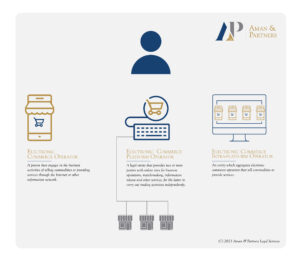The development of digital economy in general and electronic commerce in particular are in their infant stages in Ethiopia. That said, various actors, including the private sector and government, are making efforts to change this reality. With the government’s recent strategy of digitalizing the business ecosystem, the growth of electronic commerce in Ethiopia seems inevitable. Nevertheless, the legal regime governing electronic commerce in Ethiopia is not comprehensive enough as to enable its proper operationalization.
The Electronic Transaction Proclamation No. 1205/2020 (E-Transaction Proclamation), which partly regulates electronic commerce, was adopted in 2020. However, specific regulation or directive on electronic commerce is yet to be promulgated. Thus, subsidiary laws that would be important in creating an enabling environment for the implementation of electronic commerce are missing. That said, we understand that a draft electronic commerce regulation has been prepared.
According to the E-Transaction Proclamation, electronic commerce is defined as a means of transaction of goods and services through the internet or other information networks. The E-Transaction Proclamation recognizes electronic commerce operator, electronic commerce platform operator and electronic commerce intra-platform operators as electronic commerce service providers. Each of these operators are defined under the E-Transaction Proclamation as follows:

Electronic commerce platform and intra-platform operators are middlepersons who connect businesspersons and consumers through their platforms and as such facilitate the sale and delivery of products/services. On the other hand, electronic commerce operators directly sell their products or deliver services via their platforms.
Licensing of Electronic Commerce Service Providers
The licensing of business activities in Ethiopia is regulated in accordance with the Ethiopian Standard Industrial Classification Directive No. 17/2019 (ESIC). The ESIC has not been recently amended.
Despite the lack of specific regulation, directive and/or amendment to the ESIC, the issuance of business licenses for electronic commerce service providers has practically begun. While there were previously no business license categories for electronic commerce related activities, electronic commerce business licenses are currently being issued. This was made possible following the Ministry of Innovation and Technology’s (MinT) letter written to the Ministry of Trade and Regional Integration (MoTRI) requesting the inclusion of business license categories for electronic commerce. In this letter, the MinT requested MoTRI for the inclusion of electronic platform operators and electronic platform intra-operators under ESIC. In respect of electronic commerce operators, the MinT noted that there is no need to include a new business license category under ESIC even though obtaining approval from relevant regulatory authorities prior to engaging in electronic commerce would still be required.
We understand that the MoTRI is presently issuing business licenses for domestic investors to engage in electronic commerce activities.
Electronic Commerce License for Foreign Investments
The Investment Regulation No. 474/2020 (Investment Regulation) has opened electronic commerce business to foreign investment. The Investment Regulation makes a particular reference to electronic commerce with respect to wholesale and retail trade. While the Investment Regulation reserves wholesale and retail business for domestic investors, it provides that foreign investors can exceptionally engage in these sectors in so far as they carry out their business activities through electronic commerce. Whether this provision under the Investment Regulation would allow foreign investors to directly engage in the business of wholesale or retail trade through electronic commerce or whether they would be limited to operating electronic commerce platforms is far from clear.
The Ethiopian Investment Commission (EIC) has not been issuing investment licenses to foreign investors despite the opening of the sector to foreign investors in 2020. Yet, we have recently come to understand that the EIC has granted an electronic commerce license to a foreign investor in late 2022.
Foreign investors, who are allowed to engage in wholesale or retail trade of products under applicable laws, can sell products via electronic commerce without obtaining a separate electronic commerce business license. Nevertheless, such investors are still required to obtain approval from relevant regulatory authorities prior to engaging in electronic commerce.
In sum, in spite of the progress made with issuing electronic commerce business licenses, it is worth noting that there are major gaps in relation to the scope and nature of business licenses for electronic commerce.
Concluding Remarks
The Ethiopian government is taking steps to introduce and implement a framework for the business licensing of the electronic commerce sector. However, with the exception to a letter between two Ministries serving as the authoritative instrument for the regularization of the electronic commerce sector, there has not been any subsidiary legislative instrument to regulate electronic commerce sector and provide the sector into the business licenses category. With the absence of a full-fledged legislative instrument to address the regularization and operation of the electronic commerce business sector, the involvement of businesses in this sector may face multiple challenges. Hence, with a view to creating legal certainty and addressing any potential practical gaps, it would be prudent for the relevant institutions to issue subsidiary legislation addressing issues in relation to electronic commerce licensing and operations.
Disclaimer
The information contained in this legal update is only for general information purposes. Nothing herein shall be considered and relied upon as a legal advice or a substitute thereto.





